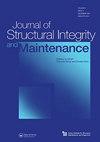Compressive strength modeling of blended concrete based on empirical and artificial neural network techniques
IF 3.1
Q2 ENGINEERING, CIVIL
Journal of Structural Integrity and Maintenance
Pub Date : 2020-09-17
DOI:10.1080/24705314.2020.1783120
引用次数: 5
Abstract
ABSTRACT This article exhibits an experimental study carried out to investigate the combined effect of Silica Fume (SF) and Metakaolin (MK) on the fresh and hardened properties of concrete. The replacement levels of SF were adopted as 5%, 10%, 15%, 20% while that of MK were 5%, 10%, 15%, 20% and 25%. The results for cube testing revealed that the use of SF and MK produces considerably good strength concrete. Based on the experimental observations, an approach to predict the compressive strength using regression modeling was suggested. The result of which rendered a reasonable agreement with the available test data. Moreover, two Artificial Neural Network (ANN) models have also been proposed to predict the compressive strength of concrete using the data obtained from the experimental exercise. Randomized stratification method was used to divide the data samples into training and testing subsets in line with machine learning best practices. The results of the ANN models were found to be in good agreement with experimental values. When compared with the results of empirical models, the respective ANN models gave a better prediction for the compressive strength. This substantiates the reliability of ANN over the empirical models.基于经验和人工神经网络技术的混合混凝土抗压强度建模
摘要:本文展示了一项实验研究,旨在研究硅粉(SF)和偏高岭土(MK)对混凝土新鲜性能和硬化性能的联合影响。SF替代水平分别为5%、10%、15%、20%,MK替代水平分别为5%、10%、15%、20%、25%。立方体试验结果表明,SF和MK的使用产生了相当好的强度混凝土。在实验观察的基础上,提出了一种基于回归模型的抗压强度预测方法。其结果与现有试验数据有较好的一致性。此外,还提出了两种人工神经网络(ANN)模型,利用实验数据预测混凝土的抗压强度。根据机器学习最佳实践,采用随机分层方法将数据样本分为训练子集和测试子集。人工神经网络模型的计算结果与实验值吻合较好。与经验模型的预测结果相比,人工神经网络模型对抗压强度的预测效果更好。这证实了人工神经网络相对于经验模型的可靠性。
本文章由计算机程序翻译,如有差异,请以英文原文为准。
求助全文
约1分钟内获得全文
求助全文
来源期刊

Journal of Structural Integrity and Maintenance
ENGINEERING, CIVIL-
CiteScore
3.90
自引率
9.50%
发文量
24
 求助内容:
求助内容: 应助结果提醒方式:
应助结果提醒方式:


